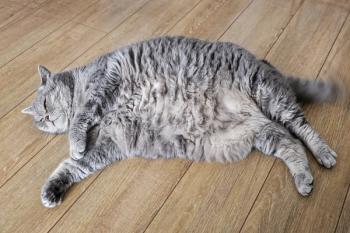
Go with the gut: Exploring a probiotics promising benefits
A probiotic already on the market could modulate immune responses in dogs and cats to help manage select clinical problems.
Dr. Michael Lappin, internal medicine professor at Colorado State University, heads a research team that's assessing whether feeding a commercially available probiotic to American pit bull terriers with juvenile generalized demodicosis can speed resolution times. Shutterstock.com.During the 2017 Purina Companion Animal Nutrition Summit, Michael Lappin, DVM, PhD, DACVIM, a professor of internal medicine at Colorado State University's College of Veterinary Medicine and Biomedical Sciences, reviewed various research studies that have explored how some probiotics can potentially modulate the immune responses of dogs and cats. While Dr. Lappin discussed a number of studies of probiotics, he focused on the commercially available FortiFlora Probiotic Supplement from Purina ProPlan Veterinary Diets (Enterococcus faecium strain SF68) because of his current studies with this probiotic.
Effects on immune response in healthy pups
Dr. Lappin reviewed one of the first probiotic-associated immunomodulation studies of puppies that were vaccinated with canine distemper virus (CDV) vaccine and fed SF68 or a placebo.1 The study showed a number of potential specific and nonspecific immunological changes over time. One finding highlighted was that the puppies fed SF68 maintained higher CDV titers over time, suggesting B cell immune stimulation. However, Dr. Lappin emphasized that the CDV antibody levels in the control group were also adequate to protect the puppies. In this study, immunological parameters were not assessed until 10 weeks after SF68 supplementation was begun; therefore, it is unknown whether effects could be detected earlier.
An adjunct in managing mange?
In his talk, Dr. Lappin showed results of a new study, soon to be published, that suggest that the immunomodulating effects of SF68 can be recognized in healthy young adult beagles as soon as four weeks after supplementation begins. These findings led to a new study designed to evaluate SF68 as an adjunct treatment for generalized demodicosis. Once demodectic mange has developed in dogs, immunosuppression with T-cell exhaustion and low numbers of circulating CD4+ lymphocytes are noted.2 In Dr. Lappin's ongoing study, his research group is assessing whether feeding SF68 to American pit bull terriers with juvenile generalized demodicosis can speed resolution times.
Effects on the immune responses in kittens
In another study, researchers assessed the immune responses of SF68-supplemented kittens after vaccination with an FVRCP-modified-live vaccine at 9 and 12 weeks of age while being fed SF68 or a placebo.3 At 27 weeks, the researchers found an increase in CD4+ cell counts without a concurrent increase in CD8+ cells, which indicates immunomodulation in the SF68 treatment group. Based on these results, Dr. Lappin's group performed a follow-up study in cats with chronic feline herpesvirus (FHV-1). In that study, the SF68-supplementation group was found to have a more stable gut microbiome and fewer episodes of conjunctivitis over time during the stress periods of the study.4
One quick caution
Dr. Lappin pointed out that not all probiotic products are created equally. Most veterinary probiotic products (23 out of 25) did not meet label claims when evaluated.5 So, Dr. Lappin advises veterinarians to purchase products from companies that have well-documented quality control and that have evaluated their products in controlled research studies.
References
1. Benyacoub J, Czarnecki-Maulden GL, et al. Supplementation of food with Enterococcus faecium (SF68) stimulates immune functions in young dogs. J Nutr 2003;133:1158-1162.
2. Ferrer L, Ravera I, Silbermayr K. Immunology and pathogenesis of canine demodicosis. Vet Dermatol 2014;25:427-e65.
3. Veir JK, Knorr R, Cavadini C, et al. Effect of supplementation with Enterococcus faecium (SF68) on immune functions in cats. Vet Ther Res Appl Vet Med 2007;8:229-238.
4. Lappin MR, Veir JK, Satyaraj E, et al. Pilot study to evaluate the effect of oral supplementation of Enterococcus faecium SF68 on cats with latent feline herpesvirus 1. J Feline Med Surg 2009;11:650-654.
5. Weese JS, Martin H. Assessment of commercial probiotic bacterial contents and label accuracy. Can Vet J Rev Veterinaire Can 2011;52:43-46.
Dr. Tad Coles is medical writer and compassion fatigue coach based in Overland Park, Kansas.
Newsletter
From exam room tips to practice management insights, get trusted veterinary news delivered straight to your inbox—subscribe to dvm360.






